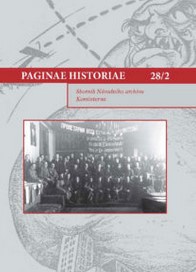VZNIK, KONEC KOMINTERNY A OTÁZKA KONTINUITY JEJÍ ČINNOSTI. VYBRANÉ OTÁZKY
THE FOUNDING AND THE FALL OF THE COMINTERN AND THE ISSUE OF ITS CONTINUITY. SELECTED ISSUES
Author(s): Emil VoráčekSubject(s): Political history, Government/Political systems, Pre-WW I & WW I (1900 -1919), Interwar Period (1920 - 1939), History of Communism
Published by: Národní archiv
Keywords: The Comintern; The Communist International; international organization;
Summary/Abstract: International socialist and workers’ movement underwent through major changes during the World War I. A historic Second International fell apart in the end. On the other hand, a part of the movement went through a radicalisation process and, after the Bolshevik revolution in Russia, was welcomed as a beacon showing the way of the future development. In this euphoria, in March 1919, the Communist International was established in Moscow as an international headquarters and organizational centre for the global radical left. The membership in this international association was limited by several conditions such as unreserved support to the Soviet state and its defence. The Comintern, from its very foundation, was conceived as an instrument of the Soviet Russian foreign policy. During the first decade of existence, the atmosphere and possibility of a at least limited discussion to the future course in the organisation faded out and representatives of the critical opinions were excluded from the movement, eliminated if necessary. The process of bolshevisation pushed through by the Russian delegation in the Comintern executive considerably transformed its sections and the organisation itself and opened career possibilities to those politicians who did not question the current course of action as dictated by the EKI and Soviet Communist Party. In the second decade of its existence, the Comintern represented a robust, organized institution working fully for the Soviet foreign politics. Shortly before the WWII began, in the moment of the complete re-orientation of the Soviet foreign policy, the Comintern stepped out with a campaign aiming at interpretation of this change and explaining the breakout of war as a struggle between two imperialist blocs. The leaders of the communist parties submitted themselves to this change, for their members, it was hard to accept such an interpretation, though. Especially difficult it was for those members active in illegality in countries occupied by Nazi Germany. The situation changed only after the Soviet Union was attacked by Ger-many and its allies in June 1941. In the further course of war, the Comintern became a burden for Stalin and Soviet leaders. The organisation was abolished, its institutions, in a modified form, continued their work. Experience gathered during two decades of its existence served well at the end of the war, after liberation of occupied territories, to implementation of Soviet policy aiming at creation of a bloc of satellite states. Governments were set up with Communist politicians who went through the Comintern schooling.
Journal: Paginae Historiae
- Issue Year: 28/2020
- Issue No: 2
- Page Range: 17-39
- Page Count: 23
- Language: Czech

